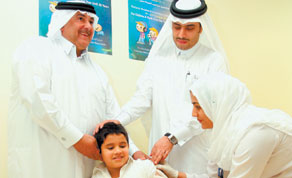 |
| Dr Mohamed al-Thani observing the vaccination of a child at the Messaimer primary healthcare centre yesterday |
To meet one of the objectives of the Qatar National Health Strategy, which is to eradicate measles in Qatar by 2015, the Supreme Council of Health (SCH) yesterday launched a nationwide campaign to vaccinate children and adolescents against the disease.
The campaign was launched at the Messaimer primary healthcare centre.
During the campaign tagged “National Measles Immunisation Campaign (MMR)”, which targets some 200,000 children and adolescents aged up to 20 years, around 10 technical teams from the SCH will visit private schools and another 27 teams from the school health unit will visit government schools.
The vaccine will also be available at all health centres two days a week.
MMR vaccine is a safe vaccine which was introduced to the country’s national schedule in 1992.
Measles is one of the most contagious diseases and it is a priority vaccine-preventable viral disease globally because of its high fatality rate.
The disease causes severe complications in children and adults, such as ear and chest infections, fits, swelling of the brain, and brain damage that could lead to death.
Qatar is one of the Eastern Mediterranean Regional Organisation (EMRO) countries at the elimination stage.
However, in the last few years there has been resurgence in new measles cases reported in different parts of the country.
So far this year, some 173 cases of measles have been reported.
The SCH’s Expanded Programme of Immunisation head and Community Medicine specialist Dr Asma al-Nuaimi explained that the resurgent of measles in Qatar was a result of demographic explosion within the last six years, where population has more than doubled, with the highest number of expatriates coming from endemic countries.
“Although in Qatar reported coverage of measles vaccination is high, measles vaccination does provide 100% protection against the disease and sero-conversion rate is 95% even when given two doses – a substantial number of children remain unprotected even if they are immunised,” she noted.
Al-Nuaimi explained that the catch-up campaign was one of the long-term activities that all EMRO countries are compelled to conduct for interrupting measles virus transmission in order to achieve regional measles elimination by 2015.
Speaking to the media at the primary healthcare centre yesterday, SCH Public Health Department director Dr Mohamed al-Thani described the campaign as “an important one and the biggest ever in Qatar”.
“We will be giving booster doses of the vaccine to a total of 200,000 children to protect them against measles as part of our national health strategy’s goals and based on the World Health Organisation’s recommendations to eliminate measles by 2015,” he explained.
According to him, the campaign is expected to reach up to 80% of the target group as some of those who may be allergic to substances in the vaccines may not be vaccinated.
“We have envisaged that there will be some children, especially those with low immune deficiency and are receiving cortisone as a therapy, that will not be giving the vaccine,” he pointed out.
He added that those having life-threatening allergic reaction to gelatin, antibiotic neomycin or had received a previous dose of the MMR vaccine as well as those who are moderately or severely ill at the time of shot schedule should also not be jabbed and that those having chronic diseases should consult their physicians before getting the vaccine.
One out of six persons that receive the vaccine may later develop fever that lasts for two-three days, or up to a week.
The official said that there are plans to begin to administer measles vaccine on newcomers, especially those from endemic countries.

